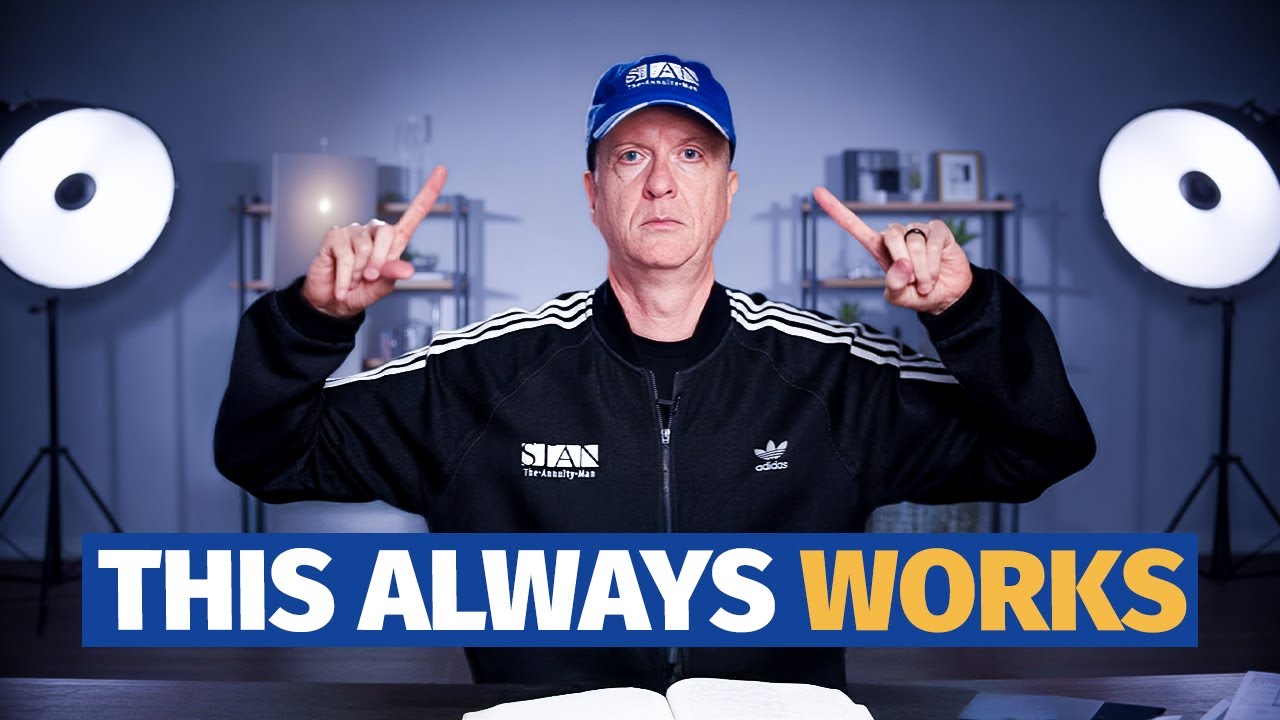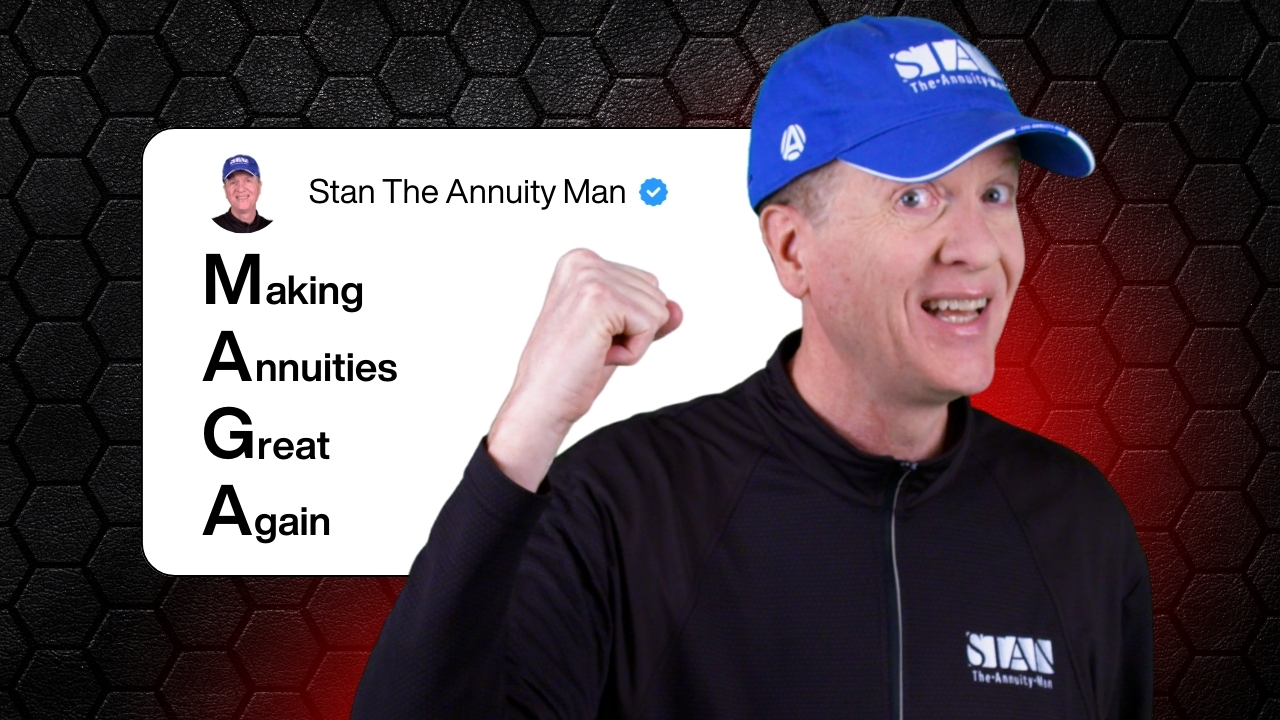Table of Contents
How Early Should I Buy Annuities?

How early should you buy an annuity? How young should you be, how old should you be? Those are really good questions. Hi, I'm Stan The Annuity Man, America's Annuity Agent, licensed in all 50 states and the top agent out here. Yes, I do sell annuities, but only if you need one. If you don't need one, I'll tell you. They have to be allocated right and in proportion, and we can have those conversations. Visit the The Annuity Man to get all my books; you can download them all for free. You can schedule a call there, listen to my podcast, and view all kinds of information.
But what we're going to talk about today is a call I get a lot from people who are too young to buy an annuity or who might be really old and not need an annuity. But we're going to talk about age. Is it too early to buy? How do you determine that? Can you time it? I'm going to pull all those things that are running in your head out, and we're going to talk about them factually now.
Life Expectancy
In my opinion, it's all about life expectancy. Lifetime income is based on your life expectancy at the time you take the payment, interest rates play a secondary role. So, the older you are, the higher the payment. I get calls from 40-year-olds- and 35-year-olds who say, "Hey, Stan, I've been pitched this annuity. Should I buy it?"
Too Young
My first question is, "How old are you?" And often, they say, "Well, I'm 39." My immediate answer is, "No." I really believe that you're too young at that age to buy an annuity. Now, for the sociopath agents out there, there are a few, and there are a lot of good people in my industry. But every industry has those people who would sell anything to anybody. They'll sell it to anybody. In my opinion, if you have 40 years of life expectancy, I'm not sure you need to buy an annuity. If you're young, you need market growth. If you need market growth, you don't need an annuity.
I know the Variable Annuity guys are going, "Stan shut up. Variable Annuity is for texture, for..." I get it. I understand that. My comment about Variable Annuities and full disclosure: I do not sell them. I only sell Fixed Annuities, and I only sell contractual guarantees. I used to have a securities license when I worked with Dean Witter, Paine Webber, Morgan Stanley, and UBS. I've been there and done that; I understand that. That's why I sell Fixed Annuities: because annuities are contractual guarantees.
But if someone's 40, their projected life expectancy is to 85, 86, that's a long time. You need market growth and can't afford things to go up and down and be volatile because you're young. So, I get many of those calls, "Hey, should I buy one?" Probably not. The exception to that, I have some exceptions. Those exceptions are 40- and 50-year-old entrepreneur maniacs who can make a ton of money. And all they really want to do is not lose money with their investments.
Client Example
I'll tell you a good story. A guy called me from Texas a while back, and he's a good client. And he's in his early 50s. "Stan, I want to buy MYGAs." I'm like, "You're 50. Why would you want to buy MYGAs? Why would you want to buy Fixed-Rate Annuities? You can do so much better in the markets." He goes, "I don't do markets." He goes, "I'm an entrepreneur. I make more money with my businesses than I'll ever make with investments. I don't want to lose any money." I'm like, "Okay, well then that makes sense." And I said, "The bottom line is you have to defer them, and there's a 59.5 rule, IRS, etc."
He got all that, but in his specific situation, after he explained his situation to me, annuities made sense because he didn't need to take risks in the markets. He was a risk-taker in his business, and this made sense to him because he didn't want to lose a penny. I mean, his comment was, "If I don't lose a penny with my investments, that's fantastic because I'm going to make a killing with the businesses that I own." That makes total sense.
But the ones that bother me are the 40-year-olds who call me and say, "I've been pitched this Index Annuity for market growth." Wrong. Fixed Index Annuities are CD products, period. Introduced a long time ago, I think it was 1995, for CD-type growth. And that's what they do. I tell that 40-year-old, "No, you don't need to do that. You need to buy real market products." Because in my world, annuities, you buy them for what they will do, not what they might do. And the will do are the contractual guarantees.
Variable Annuities
Now the Variable Annuity people are going to yell at me, but Variable Annuities have limited investment choices inside those variable annuities. We call them mutual funds, they call them separate accounts, they, the industry. So, in my opinion, if you want real market growth, you don't need any type of limitations on the choices to get you that market growth. In most cases, the 40-year-olds don't need lifetime income because if they need lifetime income now, it will be based on their life expectancy at the time they take the payment. If they get 45 years of payments, it's just not going to work, bottom line.
The Two Questions
Now, that's a carte blanche 30,000-foot view, and there are some exceptions, but for most people, if you're looking for market growth, never buy an annuity. Remember the two questions: What do you want the money to contractually do? And when do you want those contractual guarantees to happen? Most of the 40-somethings who call me say, "I just want a reasonable rate of return. I want a good market return." Then don't buy an annuity.
Now it goes on the other end of the spectrum as well. I had a 93-year-old call me the other day looking at annuities. My first question is, "You're 93, right?" "Yeah." And the guy was sharp too, man. I don't know what he's taking. He needs to write a book, which is what he needs to do. And I was like, "You don't need an annuity. I mean, go live your life. You've already beaten the actuaries; you've already won. You're 93." But this guy wanted to see what an Immediate Annuity quote would be and blah, blah, blah. I'm like, "No, no, no."
The Sweet Spot
Because the other thing with a lot of the annuity products, when you turn 80, like from 80 to 85, a lot of them are not available. Now, it depends on the carrier and the type, but your choices start going down when you turn 80. They go way down when you turn 85; they're almost non-existent into your 90s, which they should be. I mean, the sweet spot for people to look at annuities from the standpoint of purchasing, I would say, mid-50s and up. And mid-50s is a push as well. You've got to tell me what you're trying to do. If you really got a plan in place for future income down the road or you want to protect the principal, I get that. But truly, in your 40s, I'd rather you get my books, go to my site, get the books, follow what I do, and understand that when you get into your 50s, we can start having those conversations.
P.I.L.L
One final thing about how old you should be: Is it too early? When is it too early to buy an annuity? When you get on the phone with us, and we're talking one-on-one, there are times that I have 72-year-olds or 77-year-olds, that after the conversation, I'm like, "You don't need an annuity because you don't need to transfer risk." It really all comes down to whether you want to transfer risk. Annuities solve for pretty much four things. The acronym that I've come up with is called PILL. P stands for principal protection, I stands for income for life, L stands for legacy, like leaving money to your beneficiaries. And the other L stands for long-term care/confinement care, those type of things. So, P-I-L-L. If you do not need to contractually solve for one or more of those items, then you do not need an annuity. It's really that simple.
There are times I get people on the phone, and I just say, "Hey, yeah, you're 75, but who you are, and you're sharp as a tack, and you understand markets, and you're good at it, you don't need an annuity. Call me when you're done with that. Call me when you don't want to manage your assets that way anymore. Or call me when you want to start incrementally moving toward transferring risk."
I have a great story, and I've told this one before. One of my clients is a commodities trader. It's like corn or something. And he's one of the best in the world at that, and he's going to do it until he dies. He says, "Stan, I'm going to do it until I die." And I'm like, "You don't need an annuity." When I first met him, he told me. I said, "Man, you don't need an annuity." He goes, "You're right, but my wife does." Because the wife doesn't want to be a corn futures trader or whatever the heck this guy is. And every year he takes some of the profits from his trading, which is immense, and buys a future lifetime income stream or a principal protected product for his spouse, which makes sense. That's another thing as well. Again, annuities are customizable, and it doesn't fit for everybody's specific situation. So, we just need to have that conversation. Go to my site at The Annuity Man and set a time so you can talk with us.
Remember PILL, P stands for principal protection, I stands for income for life, L stands for legacy, other L stands for long-term care. Here are the other ones, too. I'll throw that down. You own an annuity for what it will do, not what it might do. So, with that, I know we're getting a little crazy here, but there's no perfect age when it comes to annuities. If you're a youngster, you probably don't need one. If you're transitioning toward retirement, you might need one. If you want to transfer risk, you need one, but we need to talk. Book a call with us, and I'll see you on the next Stan The Annuity Man blog.
Never forget to live in reality, not the dream, with annuities and contractual guarantees! You can use our calculators, get all six of my books for free, and most importantly book a call with me so we can discuss what works best for your specific situation.
.png)
.svg)
























































.jpg)


.jpg)
.jpg)
.jpg)
.jpg)

.jpg)



.jpg)
.jpg)
.jpg)
.jpg)
.jpg)
.jpg)
.jpg)


.jpg)
.jpg)
.jpg)
.jpg)

.jpg)
.jpg)


.jpg)

.jpg)

.jpg)

.jpg)
.jpg)
.jpg)

.jpg)
.jpg)
.jpg)

.jpg)
.jpg)
.jpg)
